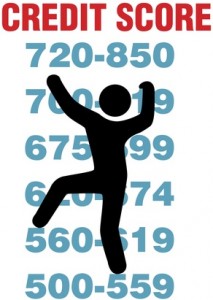You do know what your credit score is, right? If not, now would be a good time to learn what it is. The reason for this is simple. Your credit score rules your credit life. If you have a poor credit score you may not be able to rent an apartment, buy a house or a car or get new credit cards. You may have to pay more for your home and auto insurance and for any loan you are able to get.
So what the heck is a credit score?
For many years the only way a lender could determine whether or not to loan you money was to sit down and plow through your credit reports from the three credit reporting bureaus. As you might imagine this was a very time-consuming process. The people at what was then called Fair Isaac Corporation (now known as FICO) felt there had to be a better answer. Its solution was to turn all of those credit reports into a single three-digit number – your credit score. How FICO pulled this off is based on an algorithm that’s known only to it. If you don’t know your FICO score you can get it at www.myfico.com for $19.95 or for free if you take out a free trial subscription to its Score Watch program. It’s also possible to get a version of your credit score free – though it won’t be your true FICO score – from the three credit reporting bureaus or from independent websites such as CreditKarma.com or CreditSesame.com. If you have a Discover card you’re probably already getting your credit score each month along with your statement.
What lenders look for
When a potential lender checks your credit score it generally views it in ranges as follows:
- Between 700 and 850 – Very good or excellent credit score
- Between 680 and 699 – Good credit score
- Between 620 and 679 – Average or OK score
- Between 580 and 619 – Low credit score
- Between 500 and 579 – Poor credit score
- Between 300 and 499 – Bad credit score
If you have a credit score lower than 580 you need to improve it and you can – by following these tips. And they’re easy enough that following them won’t make you crazy.
Pay your debts on time
On the face of it this may seem too simple but if you create an history of consistently making your payments on time, this will boost your credit score. If you have a car payment, credit card balances, a mortgage or student loans make sure you don’t miss your payments. If you do, your account could be turned over to a collection agency and trust us, you don’t want this to happen. A debt collector can be your worst nightmare as many of them are so tenacious they make a pit bull look like a kitten in comparison
Pay off your credit cards
Here’s another simple thing you could do and that’s pay off your credit cards. If possible, pay off your full balance or balances and then go a month without using your cards. This stops you from having to pay interest, saves you money and will, of course, increase your credit score.
Fix errors
To err is human but to fix mistakes in your credit reports is divine. One recent study revealed that nearly 25% of us have errors in our credit reports that could be affecting our credit scores. You need to get your three credit reports from the credit reporting agencies – Experian, Equifax and TransUnion and go over them with a fine tooth comb. If you find errors you will need to write a letter disputing them to the appropriate credit bureau. Your letter should identify each of the items in your report that you are disputing. You will need to include whatever documentation you have that proves your case and explain why you are disputing the information. Make sure you also request that the erroneous item or items be removed or corrected. It’s best to send your letter by certified mail, return receipt requested, so you can prove that the credit-reporting agency received it. Be sure to keep a copy of your letter and your documentation.
Moderation in all things
This phrase was attributed by the Greek philosopher Aristotle to Chilo, one of ancient Greece’s Seven Sages. It basically means nothing in excess and this is especially true when it comes to credit cards. Most experts say that you should only use 20% or less of your available credit. In other words, if you have credit cards with a total credit limit of $1000, you should keep your balances under $200, which will be very good for your score.
Up your credit limit
If that 20% doesn’t give you enough credit to satisfy your monthly needs, contact your credit card issuer and ask it to increase your limit. This will keep your usage ratio low while allowing you to spend more. As an alternate to this, you could keep smaller balances on multiple cards to maintain the right ratio.
Resist the impulse to open more accounts
One of the problems with credit cards is that it is simply too easy to open new accounts. Just about every time you check out at a store you’ll be offered the opportunity to get a new card. Also, the credit card issuers are offering more and more incentives to open their cards such as cash back and airline mileage. But each time you apply for a credit card it dings your credit score by at least two points. Plus, the more credit cards you have the more tempted you might be to use them.
 Hang on to your older cards
Hang on to your older cards
Here’s a tip that’s pretty darn simple. Just hang on to those older cards. If you have been making your payments on them, this is a good indicator that you are a responsible user of credit. In the event you feel you have too many credit cards and need to close a few accounts, close the newest ones first. Also, make sure you use those older cards occasionally so that your account will look active.
Time will go by
If you were forced to declare bankruptcy because of out-of-control spending or bad luck such as an unexpected illness or loss of a job, you will just need to let time pass. It can take seven or even 10 years for that bankruptcy to drop off your credit report. The good news is that if you let time pass and that bankruptcy drops off your report, your credit score will improve significantly.
How about a secured card?
In the event you are waiting for something to drop off your credit report such as a bankruptcy or an item that went into default, you might get a secured credit card. This is where you make a cash deposit to “secure” the card. You can then use it until you’ve depleted your deposit at which time you can either add more money or simply throw away the card. But the important thing is that if you use it wisely, it will help you rebuild your credit.
The net/net
The bottom line is that it if you follow the simple tips you’ve read in this article, you can increase your credit score and have better credit without making yourself crazy






